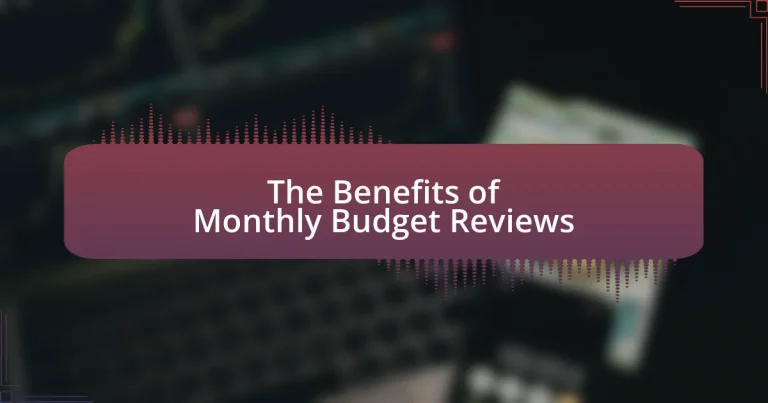Monthly budget reviews are essential for enhancing financial awareness, improving spending habits, and effectively tracking financial goals. Regular assessments of income and expenses enable individuals to identify spending patterns, leading to informed financial decisions and increased likelihood of achieving financial objectives. The article discusses the benefits of conducting monthly budget reviews, including their impact on financial health, budgeting accuracy, and debt management. It also highlights tools and best practices for effective reviews, emphasizing the importance of accountability and continuous improvement in budgeting for long-term financial success.

What are the Benefits of Monthly Budget Reviews?
Monthly budget reviews provide several key benefits, including enhanced financial awareness, improved spending habits, and better goal tracking. By regularly assessing income and expenses, individuals can identify patterns in their spending, which leads to more informed financial decisions. Research indicates that people who engage in regular budget reviews are 30% more likely to achieve their financial goals compared to those who do not. Additionally, these reviews help in adjusting budgets to accommodate changes in income or expenses, ensuring that financial plans remain relevant and effective.
How do Monthly Budget Reviews contribute to financial health?
Monthly budget reviews significantly enhance financial health by providing individuals with a clear understanding of their income, expenses, and savings. These reviews allow for the identification of spending patterns, enabling adjustments to be made that align with financial goals. For instance, a study by the National Endowment for Financial Education found that individuals who regularly review their budgets are 50% more likely to stay on track with their financial objectives. By consistently monitoring financial activities, individuals can reduce unnecessary expenditures, increase savings, and ultimately improve their overall financial stability.
What specific areas of personal finance are improved through regular reviews?
Regular reviews of personal finance improve budgeting accuracy, expense tracking, savings optimization, and debt management. By consistently analyzing spending patterns, individuals can identify unnecessary expenses and adjust their budgets accordingly, leading to more effective financial planning. Research indicates that individuals who engage in regular financial reviews are 20% more likely to meet their savings goals, as they can better allocate funds towards savings and investments. Additionally, regular assessments help in monitoring debt levels, allowing for timely repayments and reducing interest costs, which can enhance overall financial health.
How can Monthly Budget Reviews help in achieving financial goals?
Monthly budget reviews help in achieving financial goals by providing a structured approach to tracking income and expenses, allowing individuals to identify spending patterns and areas for improvement. This regular assessment enables individuals to adjust their budgets proactively, ensuring that they allocate sufficient resources toward savings and investments that align with their financial objectives. Research indicates that individuals who engage in regular budget reviews are 50% more likely to meet their financial goals compared to those who do not, as they can make informed decisions based on their financial data.
Why is it important to conduct Monthly Budget Reviews?
Conducting Monthly Budget Reviews is important because they enable individuals and organizations to track financial performance and make informed decisions. Regular reviews help identify spending patterns, assess whether financial goals are being met, and adjust budgets accordingly to avoid overspending. According to a study by the National Endowment for Financial Education, individuals who regularly review their budgets are 50% more likely to stay on track with their financial goals. This consistent evaluation fosters accountability and encourages proactive financial management, ultimately leading to better financial health.
What are the consequences of neglecting budget reviews?
Neglecting budget reviews can lead to significant financial mismanagement and unforeseen expenses. Without regular assessments, organizations may fail to identify overspending, resulting in budget deficits that can jeopardize operational stability. Additionally, the lack of budget reviews can hinder strategic planning, as outdated financial data prevents informed decision-making. Research indicates that companies that conduct regular budget reviews are 30% more likely to meet their financial goals, highlighting the importance of this practice in maintaining fiscal health.
How do Monthly Budget Reviews enhance spending awareness?
Monthly budget reviews enhance spending awareness by providing individuals with a structured opportunity to analyze their financial habits and expenditures. This regular assessment allows individuals to identify patterns in their spending, recognize areas where they may be overspending, and adjust their budgets accordingly. Research indicates that individuals who engage in regular budget reviews are more likely to stay within their financial limits and make informed spending decisions, ultimately leading to improved financial health.
What tools can assist in Monthly Budget Reviews?
Tools that can assist in Monthly Budget Reviews include budgeting software, spreadsheets, and financial apps. Budgeting software like Mint and YNAB (You Need A Budget) provides features for tracking expenses, setting financial goals, and generating reports, which facilitate comprehensive reviews. Spreadsheets, such as Microsoft Excel or Google Sheets, allow for customizable budget tracking and analysis, enabling users to visualize their financial data effectively. Financial apps, including Personal Capital, offer investment tracking alongside budgeting features, providing a holistic view of one’s finances. These tools enhance the budgeting process by offering real-time data, user-friendly interfaces, and analytical capabilities, making monthly reviews more efficient and insightful.
Which budgeting apps are most effective for tracking expenses?
The most effective budgeting apps for tracking expenses include Mint, YNAB (You Need A Budget), and PocketGuard. Mint offers comprehensive expense tracking and budgeting features, allowing users to connect their bank accounts for real-time updates. YNAB emphasizes proactive budgeting, helping users allocate funds to specific categories, which can lead to better financial management. PocketGuard simplifies expense tracking by showing how much disposable income is available after accounting for bills, goals, and necessities. These apps are widely recognized for their user-friendly interfaces and robust functionalities, making them popular choices among users seeking effective expense management solutions.
How can spreadsheets be utilized for Monthly Budget Reviews?
Spreadsheets can be utilized for Monthly Budget Reviews by providing a structured platform for tracking income and expenses, allowing users to analyze financial data effectively. Users can create categories for various expenses, input actual spending, and compare it against budgeted amounts, which facilitates identifying discrepancies. Additionally, spreadsheets enable the use of formulas to calculate totals, averages, and variances, enhancing the review process. According to a survey by the National Endowment for Financial Education, 60% of individuals who use budgeting tools, including spreadsheets, report feeling more in control of their finances, demonstrating the effectiveness of this method for managing monthly budgets.
How can one effectively conduct a Monthly Budget Review?
To effectively conduct a Monthly Budget Review, one should systematically compare actual spending against the budgeted amounts. This process involves gathering all financial statements, including bank statements, credit card bills, and receipts, to assess where money was spent.
Next, categorize expenses into fixed and variable costs to identify patterns and areas for adjustment. For instance, if dining out consistently exceeds the budget, it may indicate a need for stricter limits in that category.
Additionally, reviewing income sources and any changes in financial circumstances is crucial, as it allows for adjustments in future budgeting. Regularly tracking these metrics can lead to improved financial decision-making and better alignment with financial goals.
Research indicates that individuals who regularly review their budgets are more likely to achieve their financial objectives, as consistent monitoring fosters accountability and awareness of spending habits.
What steps should be followed during a Monthly Budget Review?
To conduct a Monthly Budget Review, follow these steps: First, gather all financial statements, including bank statements, credit card statements, and receipts. Next, compare actual spending against the budgeted amounts to identify variances. Then, categorize expenses to understand spending patterns, focusing on fixed, variable, and discretionary expenses. After that, assess the reasons for any discrepancies and adjust the budget as necessary to reflect changes in income or expenses. Finally, set financial goals for the upcoming month based on the review findings. This structured approach ensures a comprehensive understanding of financial health and aids in making informed financial decisions.
How can one analyze spending patterns during the review process?
To analyze spending patterns during the review process, one should categorize expenses into fixed, variable, and discretionary categories. This categorization allows for a clearer understanding of where money is being spent and highlights trends over time. For instance, tracking monthly expenses against a budget can reveal consistent overspending in certain categories, such as dining out or entertainment. Additionally, using tools like spreadsheets or budgeting apps can facilitate the visualization of spending trends, making it easier to identify patterns. Research indicates that individuals who regularly review their budgets can reduce unnecessary expenses by up to 20%, demonstrating the effectiveness of this analysis in managing finances.
What common mistakes should be avoided in Monthly Budget Reviews?
Common mistakes to avoid in Monthly Budget Reviews include failing to track all expenses, neglecting to adjust for unexpected costs, and not comparing actual spending against the budget. Tracking all expenses ensures a complete financial picture; neglecting unexpected costs can lead to budget shortfalls, as studies show that unplanned expenses can account for up to 20% of monthly spending. Additionally, not comparing actual spending against the budget can result in missed opportunities for savings and financial adjustments, as regular reviews can reveal spending patterns and areas for improvement.
How can unrealistic expectations impact the review process?
Unrealistic expectations can significantly hinder the review process by creating a disconnect between anticipated outcomes and actual performance. When stakeholders set unattainable goals, it leads to frustration and disengagement among team members, as they may feel overwhelmed or incapable of meeting these demands. Research indicates that when expectations are misaligned, it can result in decreased morale and productivity, ultimately affecting the quality of the review outcomes. For instance, a study published in the Journal of Organizational Behavior found that unrealistic performance expectations can lead to increased stress and burnout, which negatively impacts team dynamics and overall effectiveness in achieving budgetary goals.
What are the pitfalls of not adjusting budgets based on review findings?
Not adjusting budgets based on review findings can lead to significant financial mismanagement. Organizations may overspend in areas that are no longer aligned with their strategic goals, resulting in resource allocation that does not reflect current priorities. This misalignment can cause cash flow issues, as funds may be tied up in ineffective projects or departments. Additionally, failure to adjust budgets can hinder the ability to respond to market changes or unexpected expenses, ultimately impacting overall financial health and operational efficiency. Historical data shows that companies that regularly adjust their budgets based on review findings are 30% more likely to meet their financial targets compared to those that do not.
What are some best practices for successful Monthly Budget Reviews?
Successful monthly budget reviews involve several best practices that enhance financial management. First, consistently compare actual spending against the budgeted amounts to identify variances. This practice allows for timely adjustments and better financial control. Second, categorize expenses into fixed and variable to understand spending patterns clearly. This categorization aids in pinpointing areas for potential savings. Third, involve all stakeholders in the review process, ensuring transparency and collective accountability, which can lead to more informed financial decisions. Fourth, set specific financial goals for the upcoming month based on the review findings, which helps in maintaining focus and motivation. Lastly, document insights and lessons learned from each review to improve future budgeting processes. These practices are supported by financial management studies indicating that regular reviews can lead to improved financial outcomes and increased savings.
How can setting specific goals enhance the review process?
Setting specific goals enhances the review process by providing clear benchmarks for evaluation. When individuals or teams establish precise objectives, they can measure progress against these defined targets, leading to more focused discussions and actionable insights during reviews. Research indicates that goal-setting improves performance by 20-25% (Locke & Latham, 2002), demonstrating that specificity in goals leads to greater accountability and motivation. This structured approach allows for identifying areas of success and opportunities for improvement, ultimately making the review process more effective and aligned with desired outcomes.
What role does accountability play in maintaining budget discipline?
Accountability is crucial in maintaining budget discipline as it ensures individuals and organizations are responsible for their financial decisions and actions. When accountability is established, it creates a culture of transparency and ownership, which encourages adherence to budgetary constraints. For instance, research by the Association of Chartered Certified Accountants indicates that organizations with strong accountability frameworks are 30% more likely to meet their budget targets consistently. This correlation highlights that when stakeholders are held accountable for their spending, they are more likely to make informed financial choices, thereby reinforcing budget discipline.
How can Monthly Budget Reviews lead to long-term financial success?
Monthly budget reviews can lead to long-term financial success by enabling individuals to track their spending, identify areas for improvement, and adjust their financial strategies accordingly. Regularly assessing financial habits allows for the detection of unnecessary expenses, which can be redirected towards savings or investments. According to a study by the National Endowment for Financial Education, individuals who engage in regular budgeting are 50% more likely to feel financially secure and achieve their financial goals. This consistent evaluation fosters discipline and accountability, ultimately contributing to better financial health over time.
What strategies can be implemented to ensure continuous improvement in budgeting?
To ensure continuous improvement in budgeting, organizations can implement strategies such as regular monthly budget reviews, variance analysis, and stakeholder engagement. Monthly budget reviews allow teams to assess performance against the budget, identify discrepancies, and make necessary adjustments, fostering a culture of accountability and responsiveness. Variance analysis helps in understanding the reasons behind budget deviations, enabling informed decision-making and proactive measures to address issues. Engaging stakeholders in the budgeting process ensures diverse perspectives are considered, leading to more accurate forecasts and alignment with organizational goals. These strategies collectively enhance the budgeting process, driving efficiency and effectiveness in financial management.
How do Monthly Budget Reviews foster a proactive financial mindset?
Monthly budget reviews foster a proactive financial mindset by encouraging individuals to regularly assess their spending habits and financial goals. This consistent evaluation allows individuals to identify areas for improvement, adjust their budgets accordingly, and anticipate future expenses. Research indicates that individuals who engage in regular financial reviews are more likely to achieve their financial objectives, as they develop a greater awareness of their financial situation and can make informed decisions. For instance, a study by the National Endowment for Financial Education found that individuals who actively manage their budgets report higher levels of financial confidence and stability.





